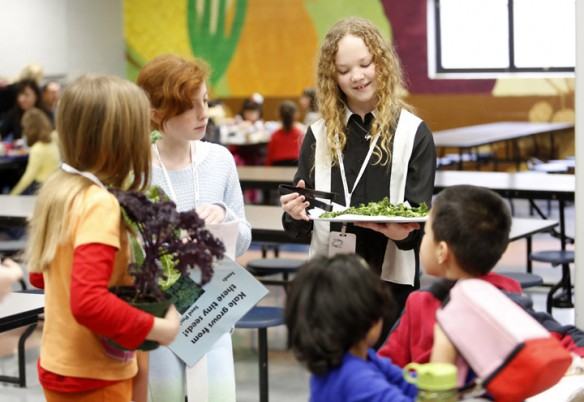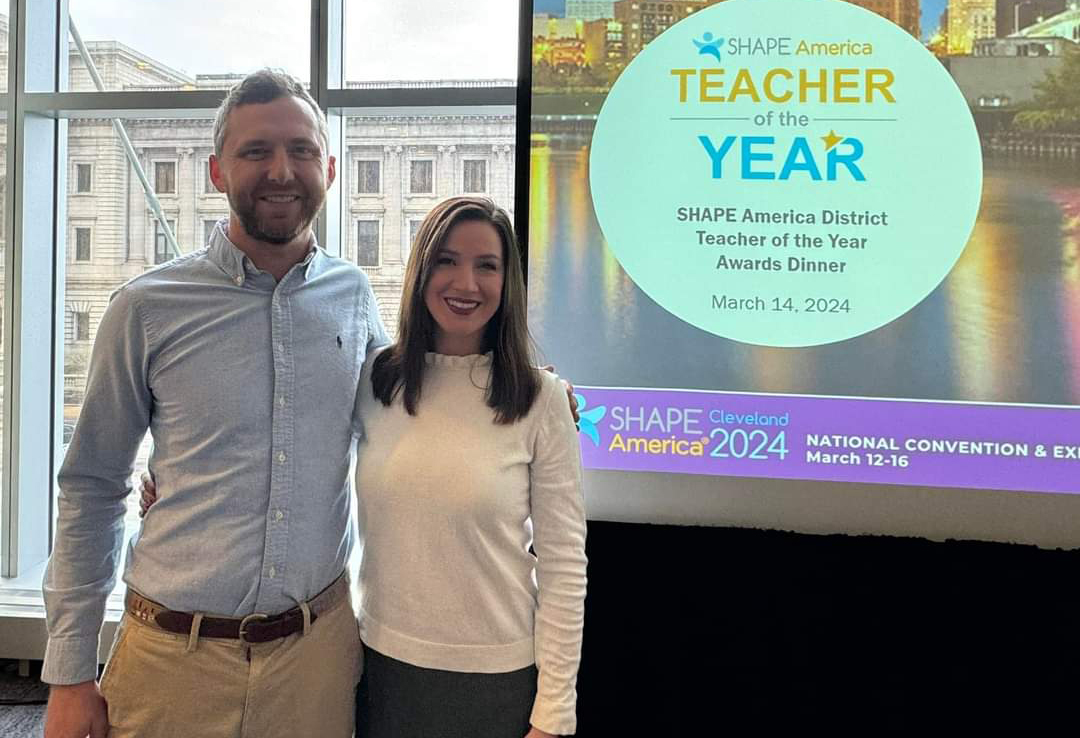
Student Energy Team members Mikayla Elverson, Madison Woods and Natalie Fowler pass out samples of kale chips during lunch at Rosa Parks Elementary School (Fayette County). Team members also shared information about the kale plant and informed students the kale was grown in Bourbon County as part of the Farm to School program.
Photo by Amy Wallot, Jan. 17, 2013
By Susan Riddell
susan.riddell@education.ky.gov
Early in 2012, Rosa Parks Elementary School (Fayette County) was named a Green Ribbon School for being an energy-efficient campus.
A few months later, the school earned a ribbon of a different color.
Boosted by a number of efforts and improvements in test scores – particularly science scores – the K-5 school was named a National Blue Ribbon School.
The Blue Ribbon School program rewards schools that score in the top 10 percent statewide in reading and mathematics on state assessments.
Trapp Elementary (Clark County) and Porter Elementary (Johnson County) schools were the other state public schools to earn the Blue Ribbon honor in 2012. Both schools will be profiled in Kentucky Teacher in March and April.
Rosa Parks Principal Leslie Thomas said her school’s Green and Blue Ribbon recognitions go hand in hand. When the school moved to its current location in 1997, mathematics and science already were highly-targeted areas of instruction.
The school council, six years later, added a science lab teacher to its staff.
“We put this in our special class rotation for students to augment their classroom science lessons with additional lab time,” Thomas said. “As we grew and changed over time, our science lab started to promote activities to improve the environment of our campus and surrounding areas.”
Students began recycling and focusing on other environmental issues, Thomas said. Then, in 2009, leaders created Rosa Parks’ sustainability team when they noticed such a hardened focus on energy-saving efforts. That same year, the school was selected to pilot a Fayette County school district program where one lamp was removed from each overhead light in the hallways and classrooms.
Fourth-grade teacher Katy Hollinger said this significantly reduced energy and increased motivation even more.
In 2011, the school was named an Energy Star school after reducing energy consumption by 47 percent and saving $52,000.
Hollinger said the biggest reward is knowing that the Rosa Parks community is much more sustainable and that students’ efforts are now habits they will carry with them for years to come.
“It’s vital that we teach our children, the future, the importance of saving energy in any way that we can,” Hollinger said. “Even the little things count.”
Hollinger and reading intervention teacher Suzanna Weisenfeld lead the school’s sustainability team. Prior to the formation of the team, Weisenfeld began a recycling program for teachers at the school 11 years ago. Shortly after that, a student-led team started with 5th graders. The students go from room to room three days a week collecting recyclables.
Joining the team is a competitive process, Weisenfeld said, with students applying for 16 spots on the team.
The school’s student Energy Star team has room for more students with 30 slots, but it, too, is a competitive process to make the team. This team meets twice a month, studies sustainability and completes school energy audits.
All classroom teachers at Rosa Parks do their part to promote the sustainability, and the Green Ribbon honor wouldn’t have been possible without complete buy-in from all staff members, Weisenfeld said.
“We work together to make a great environment for students to learn and succeed,” she said.
The energy-conscious efforts at Rosa Parks have translated into improved test scores. “It’s definitely made a difference in science scores,” Hollinger said.
On the 2012 K-PREP tests, more than 93 percent of Rosa Parks 4th graders scored proficient or distinguished, compared to 73.9 percent in Fayette County. Of that 93.5 percent, 69.7 percent were distinguished.
“As our students worked on environmental, recycling and watershed projects, we began to see the importance of the hands-on project and how it was beginning to directly impact student learning,” Thomas said. “We are excited about the new science standards and how we will be able to integrate our green programs into the new standards. The new standards will serve to give our teachers more purpose and direction as we continue to raise the bar for student success.”
MORE INFO …
Leslie Thomas, leslie.thomas@fayette.kyschools.us, (859) 381-3132
Katy Hollinger, katy.hollinger@fayette.kyschools.us, (859) 381-3132
Suzanna Weisenfeld, suzanna.wesienfeld@fayette.kyschools.us, (859) 381-3132










Leave A Comment